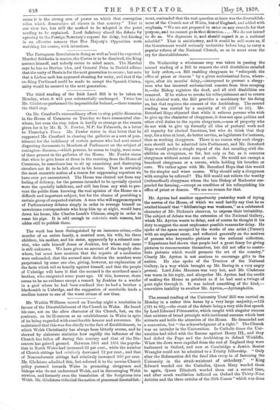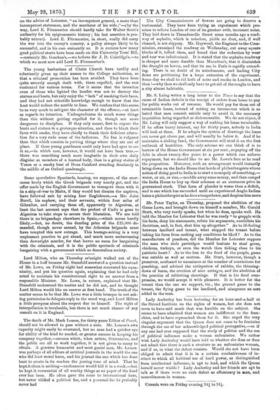The second reading of the University Tests' Bill was carried
on Monday in a rather thin house by a very large majority,-125 (191 to 66),—the event of the debate being a very able first speech by Lord Edmund Fitzmanrice, which caught with singular success that mixture of broad principle with incidental sarcasm which best attracts and holds the attention of the House. He demanded not a concession, but "the acknowledgment of a right." The Church was an intruder in the Universities. In Catholic times the Uni- versities had sided with the Barons against Henry III., and they had defied the Pope and the Archbishop to defend Wickliffe. When the Jews were expelled from the rest of England they were harboured in Oxford, and now at Cambridge a Jewish Senior Wrangler could not be admitted to a Trinity fellowship. "Only after the Reformation did the fatal idea creep in of fastening the University in the strait-waistcoat of orthodoxy." " King Edward weeded out the Catholics, Queen Mary weeded them in again, Queen Elizabeth weeded them out a second time, and after much vacillation inflicted on Oxford the Thirty-Nine Articles and the three articles of the 36th Canon" which was done
on the advice of Leicester, "an incompetent general, a more than incompetent statesman, and the murderer of his wife ;"—(by the way, Lord E. Fitzmaurice should hardly take Sir Walter Scott's -authority for his epigrammatic history ; his last assertion is pro- bably untrue). Lord E. Fitzmauriee, in. short, really did carry the war into the enemy's country, a policy always likely to be successful, and in his case eminently so. It is curious how many good political starts have been made on this University Tests' Bill, —certainly Mr. Goschen's,—we believe Sir J. IL Coleridge's,—to 'which we must now add Lord E. Fitzmaurice'e.































 Previous page
Previous page